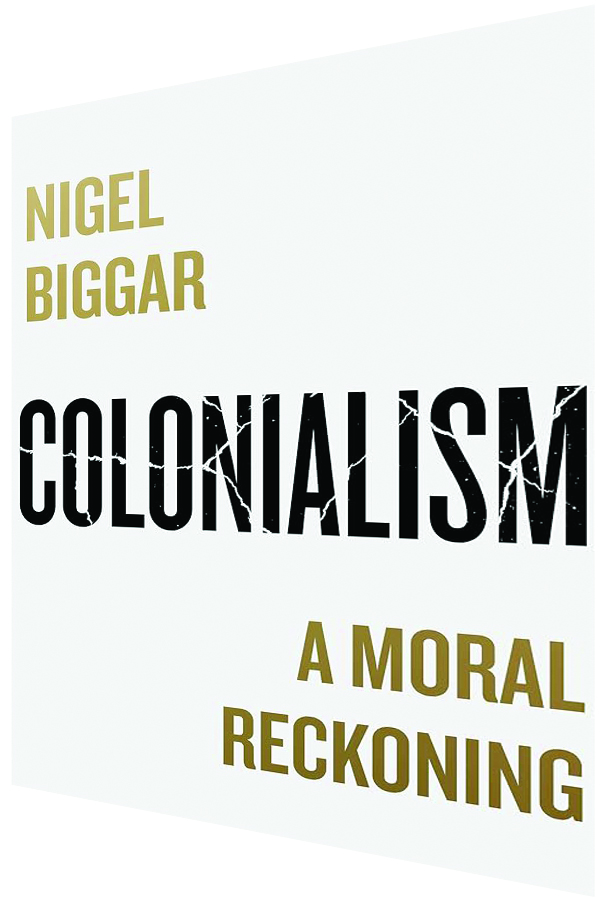 Colonialism: a moral reckoning
Colonialism: a moral reckoning
Nigel Biggar
william collins
Rs.899
Pages 480
In an unabashed defence of British colonialism, the author has waded into familiar debates in a rather superficial manner
In attempting to defend the empire Nigel Biggar, Director and Regius Professor Emeritus of Moral & Pastoral Theology at Oxford University, has waded into several familiar debates in a rather superficial manner, usually ignoring writings which do not serve his purpose, and relying on scholars whose positions coincide with his own. Perhaps this is partly due to his inadequate familiarity with historical literature on questions which are relevant for the moral assessment being undertaken by him.
One example would suffice: the abolition of slavery. Britain was an active participant in the Atlantic slave trade for over 150 years before, beginning to realise towards the end of the 18th century that it was an evil business. This was, according to Biggar, the outcome of the efforts of abolitionists. Their successful campaign led to the end of the slave trade, and eventually slavery — hardly an original argument.
In putting forth his argument he debunks the classic study of Eric Williams, Capitalism and Slavery. The book was first published in 1944 and reissued as a Penguin Modern Classic in 2022, indicating its continuing relevance. Williams demonstrated the linkages between the Atlantic slave-trade, slavery in the Caribbean, and the Industrial Revolution for which the slave trade was an important source of capital. But by the end of the 18th century, slavery was no longer economically viable. This became one of the factors prompting the abolition of slavery in the 1830s.
After summing up Williams’ thesis, Biggar refers to some recent and not so recent writings which have critiqued or caricatured it. He is not interested in important writings which have deepened our understanding of slavery and its abolition, such as the studies of CLR James, W.E.B. Du Bois and more recently of Robin Blackburn. Nor does he take into account the role of slave resistance in creating conditions that led to the end of slavery.
The role of the slave revolt in Haiti (Saint Domingue) in the 1790s can hardly be overemphasised in this context. The successful revolt shook the institution to its foundations. Blackburn’s significantly titled The Overthrow of Colonial Slavery: 1776-1848 (1988), which shifted the focus away from the abolitionist movement, is not mentioned even in the bibliography while there is just a passing reference to his later work, The Making of New World Slavery (2010). No serious discussion on this question can afford to disregard Blackburn’s massive volumes.
Biggar’s estimate for the total number of slaves imported into the American continent by British merchants is 3,259,443, between 1660 and 1807 (the year in which the slave trade was outlawed), the generally accepted number. The Portuguese shipped around double that number between the 1500s and 1860s. This gives us an idea about the magnitude of the Atlantic trade. Nevertheless, the book is not concerned about the implications the enslavement of such a huge number of Africans had for African societies or the toll it took on the psyche of the slaves. Just two brief paragraphs are devoted to the issue.
Commenting on the view that once the conscience of the English had been awakened and they realised the iniquity of slavery, they took steps to do away with the system, CLR James had remarked: “Those who see in abolition the gradually awakening conscience of mankind should spend a few minutes asking themselves why it is that man’s conscience, which had slept peacefully for so many centuries, should awake just at the time that men began to see the unprofitableness of slavery as a method of production in the West Indian colonies.”
Similarly, in the section in the chapter entitled ‘Free Trade, Investment and “Exploitation”’, which deals with the impact of colonialism on the Indian economy, the author avoids engaging with the large literature on deindustrialization, drain of wealth, forced commercialisation, and famines, essential for an understanding of the processes which led to the impoverishment of India under colonial rule. He relies almost exclusively on the work of Tirthankar Roy. The clarity, accessibility and sophistication of Roy’s extensive writings are valuable for presenting a rosier picture of the colonial economy than is warranted.
The insights of early nationalists have been further enriched by the research of, among others, Utsa Patnaik, Amiya Bagchi, Tapan Raychaudhuri, Irfan Habib, Bipan Chandra and Benay Bhushan Chaudhuri, none of which is mentioned. The only critical work cited is Shashi Tharoor’s well-argued Inglorious Empire (published as An Era of Darkness), which is a work of synthesis. It is astonishing that Biggar should so confidently endorse Roy’s “positive conclusion overall” of British rule without having bothered to acquaint himself with the writings of any of the scholars whose views Roy has critiqued in attempting to provide a revisionist narrative.
Among the main items on the book’s agenda is reinstatement of the reputation of Cecil Rhodes, arch imperialist, tool of British colonialism in Africa, diamond and gold mining magnate. Biggar tells us that the ‘Rhodes Must Fall’ campaign was one of the reasons which prompted him to write the present book. He declares that Rhodes was not racist, loved Africans, took over territories which became part of his personal empire of Rhodesia because Africans were fighting among themselves, and promoted democratic values. Rhodes’ career is too well known for those familiar with its murky details to be taken in by such a favourable appraisal. The issue which the book completely sidesteps is how Rhodes was instrumental in creating the framework for supply of cheap labour for the diamond and gold mining industry. Biggar has hardly anything to say about this or about apartheid.
Apartheid was ultimately a structure for keeping Blacks as an under-class in subjugation, to obtain semi-free labour in large numbers on a regular basis for mines and agriculture. Rhodes, along with his two associates Alfred Beit and Barney Barnato had managed to establish a monopoly over the diamond mines of Kimberley by the 1870s. The model they perfected was subsequently replicated on a much larger scale in the gold mines of Witwatersrand from the late 1880s onwards.
Biggar endeavours to whitewash numerous other sins of British colonialism, and there is little point in multiplying examples since there is already a rich scholarship which has highlighted its destructive impact. Societies are still grappling with problems of poverty, displacement and conflicts created by colonial rule. The author has a strange notion of morality, a morality which is utterly devoid of compassion for the victims of colonialism.



























